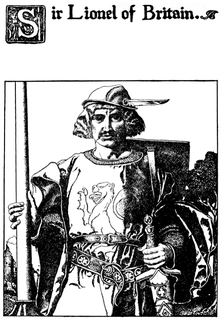This article relies largely or entirely on a single source .(June 2015) |
Willie and Lady Maisry is Child ballad number 70. [1]
This article relies largely or entirely on a single source .(June 2015) |
Willie and Lady Maisry is Child ballad number 70. [1]
Willie kills the watch on Lady Maisry's father's hall to get to her chamber. After the night, her father kills him. Lady Maisry taxes him with it. He may tell her that Willie killed the guard, but she retorts that they were in armor but Willie was not.
This ballad has much in common with Clerk Saunders , with some influence from The Bent Sae Brown . [2]

Sir Lionel is the younger son of King Bors of Gaunnes and Evaine and brother of Bors the Younger in Arthurian legend since the Lancelot-Grail cycle. He is a double cousin of Lancelot and cousin of Lancelot's younger half-brother Ector de Maris.

Billy Blind, Billy Blin, Billy Blynde, Billie Blin, or Belly Blin is an English and Lowland Scottish household spirit, much like a brownie. He appears only in ballads where he frequently advises the characters. It is possible that the character of Billy Blind is a folk memory of the god Woden or Odin from Germanic mythology, in his "more playful aspect" and is speculated to have been the same character as Blind Harie, the "blind man of the game" in Scotland.
Willie's Lady is Child ballad number 6 and Roud #220. The earliest known copy of the ballad is from a recitation transcribed in 1783.

Lord Thomas and Fair Annet is an English folk ballad.
The Gay Goshawk is Child ballad number 96.
Leesome Brand is Child Ballad number 15 and Roud #3301.
The Bent Sae Brown is Child ballad 71.
Fause Foodrage is Child ballad 89, existing in several variants.
The Bonny Birdy is Child ballad 82.
Willie o Couglas Dale or Willie O Douglas Dale is Child ballad 101.
"Gil Brenton" is Child ballad 5, Roud 22, existing in several variants.
Erlinton is #8 of the Child Ballads, the collection of 305 ballads from England and Scotland, and their American variants, collected by Francis James Child in the late nineteenth century. The collection was published as The English and Scottish Popular Ballads between 1882 and 1898 by Houghton Mifflin in ten volumes and later reissued in a five volume edition.
"Earl Brand" is a pseudo-historical English ballad.
"Young Andrew" is an old song catalogued as Child ballad 48.
Sweet William's Ghost is an English Ballad and folk song which exists in many lyrical variations and musical arrangements. Early known printings of the song include Allan Ramsay's The Tea-Table Miscellany in 1740 and Thomas Percy's Reliques of Ancient English Poetry in 1765. Percy believed that the last two stanzas of the version he published were later additions, but that the details of the story they recounted were original.
Clerk Saunders is Child ballad 69. It exists in several variants.
Willie's Fatal Visit is Child ballad 255.
Lady Maisry is Child ballad 65, existing in many variants.
The Twa Knights is a traditional Scottish ballad. It was collected by Francis James Child as Child ballad number 268. It is highly possible that the ballad was popularly unknown in Scotland, and only known through print. It has since been given the Roud number of 303.
Thomas o Yonderdale is Child ballad number 253; Roud number 3890. Child assessed that this "apocryphal" ballad seemed like a recent fabrication from a pastiche of other ballads.
| This folk song–related article is a stub. You can help Wikipedia by expanding it. |